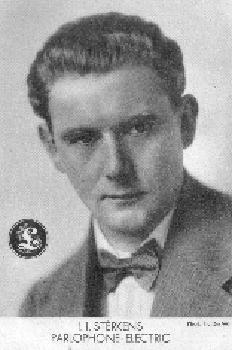Jozef Sterkens
Steuren, now Sterkens, made his debut as a concert singer in 1924, and the operatic debut in 1925 at the Royal Flemish Opera
Antwerp, where he was to spend his entire career, into the 1940s. From 1935 to 1942, he was also that theater's director.
The positively bizarre hostility between Dutch and French speakers that has been shaping Belgium from time immemorial was
particularly virulent in Antwerp between the two World Wars; there was, other than the Royal Flemish, also a Royal French Opera
(until 1933), and Sterkens, who performed exclusively in Dutch ("Flemish", for Belgian standards), quickly became a symbol of
the Flemish nationalists. He participated in the Flemish premieres of numerous works: Sadko (1925), Paganini and Její
pastorkyňa (both 1927), Sly (1929), Die tote Stadt (1932) and Daphne (1939). He was a good friend of the Flemish composer
Renaat Veremans, whose songs he often performed in concert, and whose opera Anne-Marie he premiered in 1937. From 1931, he
appeared also in Flemish movies.
In 1942, he resigned from his post at the Antwerp opera, and became director of the Alhambra Theater in Brussels, where he also
made his last appearance as a singer in 1943, as Florestan. The Alhambra Theater was used by the German occupying forces for
closed performances for the Wehrmacht, and by the Flemish fascists for their political meetings, so accepting the directorship
of that theater was definitely a political statement. After Belgium's liberation from the Nazis in September 1944, Sterkens was
accordingly imprisoned in Antwerp as a Nazi collaborator, for eight-and-a-half months, and after that lost his civil rights for
a further year. He spent the rest of his life socially isolated, and died just when he was to be officially rehabilitated. Die Meistersinger von Nürnberg (Eisslinger) – Antwerp, Flemish Opera, 1925/6 Sadko – Antwerp, Flemish Opera, 1925 Die Zauberflöte – Antwerp, Flemish Opera, 1927 Paganini – Antwerp, Flemish Opera, 1927 Její pastorkyňa (Jenůfa) – Antwerp, Flemish Opera, 1927 Sly – Antwerp, Flemish Opera, 1929 Fidelio – Antwerp, Flemish Opera, 1929 Die tote Stadt – Antwerp, Flemish Opera, 1932 Anne-Marie – Antwerp, Flemish Opera, 1937 Daphne – Antwerp, Flemish Opera, 1939 Das Lied der Liebe – Antwerp, Flemish Opera Rigoletto – Antwerp, Flemish Opera Die Fledermaus – Antwerp, Flemish Opera La campana sommersa – Antwerp, Flemish Opera Der fliegende Holländer – Antwerp, Flemish Opera Faust – Antwerp, Flemish Opera Parsifal (Knight) – Antwerp, Flemish Opera Vagabond king (composer Friml) – Antwerp, Flemish Opera L'amico Fritz – Antwerp, Flemish Opera I gioielli della madonna – Antwerp, Flemish Opera Friederike – Antwerp, Flemish Opera Sadko (Foma Nazaryich, Hindu Merchant) – Antwerp, Flemish Opera Les contes d'Hoffmann – Antwerp, Flemish Opera Beatrijs – Antwerp, Flemish Opera Prodaná nevěsta – Antwerp, Flemish Opera Tannhäuser (Heinrich, Walther) – Antwerp, Flemish Opera Der Rosenkavalier – Antwerp, Flemish Opera Het Mirakel (composer Veremans) – Antwerp, Flemish Opera Lohengrin – Antwerp, Flemish Opera Vlammend land (composer Atterberg) – Antwerp, Flemish Opera La bohème (Leoncavallo) – Antwerp, Flemish Opera Herbergprinses (composer Blockx) – Antwerp, Flemish Opera Tiefland (Nando, Pedro) – Antwerp, Flemish Opera Salome (Narraboth) – Antwerp, Flemish Opera Madama Butterfly – Antwerp, Flemish Opera Quinten Massijs (Composer Wambach) – Antwerp, Flemish Opera Carmen (Remendado) – Antwerp, Flemish Opera Die toten Augen (Shepherd) – Antwerp, Flemish Opera Marieke van Nijmegen (Composer Uyttenhove) – Antwerp, Flemish Opera Der lustige Bauer – Antwerp, Flemish Opera Princess Sunshine – Antwerp, Flemish Opera Snegurochka – Antwerp, Flemish Opera Tristan und Isolde (Seemann) – Antwerp, Flemish Opera I want to thank Tom Silverbörg for the recording (Die tote Stadt). I want to thank Georges Cardol for the picture. Reference: Richard T. Soper Belgian opera houses and singers. The Reprint Company, Spartanburg, South Carolina, 1999. The Record Collector, Volume 36, March 1991. |
